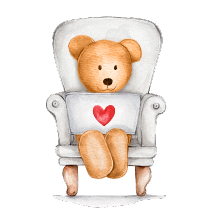
Caring for a heart child

If your child is born with a heart defect, welcome it into the world with open arms and take heart. Every parent wishes their little heart and soul to have the best start in life and no expecting parent wants to imagine the unexpected. Caring for a child with CHD can be challenging for the whole family and you will face many questions as your daily life changes.

Further information:


When parents are told that their child has a congenital heart defect and become heart parents, this is a lot to take in.
You will have to process this information and the emotions that come with it for yourself, with your partner and as a family in order to be able to accept the new situation.
Remember that you and your partner are both experiencing the same emotional trauma, but people deal with this state of shock in different ways. While one parent might need and seek emotional support from their partner, their partner might not have the capacity to offer that support as they struggle themselves.
Everyone processes trauma differently – in different ways and at different times.
It is completely normal if one parent needs more time than the other. The time it takes to work through all the emotions and thoughts you have and to reach a stage of acceptance depends on your personality as well as circumstances, e.g. when the diagnosis was made (during pregnancy, after the birth or later), whether the baby needs surgery, treatment plans and prognosis. Both parents might also react differently based on their background, such as age, education and religion, or their personality. It is therefore impossible to predict how someone responds to and deals with a CHD diagnosis for their child.


This difficult and worrying time can put a strain on your relationship and affect how you engage with your partner. The diagnosis in itself as well as how you deal with it individually can make it difficult to take care of each other. It is to be expected that you and your partner might:
- Experience physical exhaustion
- Experience mental and emotional exhaustion caused by stress, anxiety, grief and difficulty focussing
- Not have enough time for yourself
- Feel unable to process the situation
- Feel overwhelmed and helpless
- Worry that your partner might not be able to cope if you show weakness or become upset
- Worry that you will take on your partner’s pain on top of yours
- Worry you might hurt your partner
- Feel completely lost
If you or your partner experience any of these feelings and thoughts your instinct might be to give them space and time to process. However, this might not be what your partner needs. Now more than ever, it is important that you are there for each other, are open with each other and communicate with each other in order to take care of yourself, your partner and your relationship.


Being told that your child has a heart defect is an emotional shock that might make you or your partner shut down and withdraw. Even after the initial blow, you might find the situation as well as your partner’s and your own reactions difficult to accept or understand. It is perfectly normal to suddenly experience a range of emotions you have never felt before.
Because these emotions are completely unfamiliar and new to you, you might react in ways you did not expect or that are different from your normal behaviour. You might feel like you don’t know who you are anymore. This can also be difficult for your partner or you as the partner. It might feel like you suddenly don’t recognise the person next to you.
Such changes in behaviour and needs are not necessarily an obstacle or problem to solve. They can open up a different path and guide you through this difficult time. You might discover resources within yourself – an inner strength and courage – you didn’t know you had. Even though it might seem surprising and unexpected to experience positive emotions in that sense, most people are able to embrace them and find them helpful. It can be more difficult to take them onboard, however, if the people around you or you yourself deem these feelings inappropriate or socially unacceptable.


Sometimes, when your sick child needs you the most, all you want to do is walk away. Maybe you even wish that your child were never born. Having these thoughts can make you feel guilty and believe that you are a bad parent, not equipped to raise a child with CHD. It is normal to experience feelings of shame, disappointment and powerlessness in this situation.
Most people naturally turn to their partner for support and solace. But since they are in the same boat and likely experiencing the same emotions, they might not be in a place to provide comfort while they are in need of comfort themselves.
If your partner’s coping mechanism is very different from your own, this can cause conflicting emotions and lead to unhelpful comparisons. They might feel a greater need to constantly be with the child, to protect them and make “sacrifices” by taking on more responsibilities. In turn, this can make you feel worse, less able or more guilty for asking for help. It is important to notice that these feelings of guilt can sometimes arise within yourself rather than your partner making you feel guilty.
Nobody knows how “normal” they will react in such difficult and unprecedented circumstances.
When faced with an unexpected and emotionally traumatic diagnosis, however you react is normal. There is no such thing as a good or bad, right or wrong way to react. Whatever your thoughts and emotions, they are nothing to feel ashamed of and they do not make you weak or lesser. What you can do to help yourself, your partner and your family is to notice and recognise these feelings, anxieties and coping behaviours so you can actively address them and move forward one step at a time.


The new and unexpected situation you find yourself in also affects your home and family life.
In order to overcome the challenges before you, you might have to renegotiate and take on different roles. It is easy for both partners to suddenly find themselves reverting to or being pushed into more traditional gender Dynamics.
- The primary caretaker has to spend more time with the child and might have to give up their job to do so. In most cases, that responsibility is taken on by the mother.
- The main earner – often this falls to the father – is likely forced to spend more time at work, especially if they have to compensate for costs and expenses due to the child’s needs and a potential loss of income if their partner has to stay at home.
- Having such a decision sprung on you and your partner and having to upend previously established roles can put a lot of strain on a relationship. This might cause you to grow distant, also physically, and struggle to communicate with each other.


Having a child with CHD means you will have to tackle and master a variety of challenges together as a family – dealing with worries and fears, reorganising your daily life, accommodating unscheduled hospital visits. This is no easy task for any relationship.
In order to stay connected and successfully navigate this difficult time together there are a few strategies you can bear in mind to help you communicate well with each other. Many of these things might seem banal or par for the course but it is all too easy to lose sight of them, particularly when you are under a lot of stress.
- Find a good moment to talk. Everyone is likely to feel physically and/or emotionally exhausted at the end of a long day. If the right time to talk does not present itself – make time, together.
- Try to remain calm and rational in discussions in order to avoid getting into emotional arguments. Try not to get swept up in the day’s events or a flurry of feelings.
- Be open and honest with each other. If anyone can understand what caring for a child with CHD is like in your particular situation, it’s your partner.
- Listen to your partner without preconceived judgment. If you have already made up your mind, it is impossible to genuinely communicate with each other.
- Try to put yourself in your partner’s shoes. It is important to share and be able to understand each other’s experiences, especially when the new roles you have to step into mean you lead more separate lives.
- Respect your partner. Respect is the basis for any solution to work long-term.
- Have faith and trust in your partner – and in yourself.
- Be patient – with yourself, your partner and the situation. Nobody can ever be prepared for a CHD diagnosis and nobody can expect you to know what to do and handle everything smoothly.
- Keep going – don’t give up!


Knowing that you are not alone, that you are in this together, is a lifeline. Yet there are moments when you are too exhausted, overwhelmed or empty to have the capacity to help someone else.
The more love you give, the more love you receive. This is equally true for respect and understanding.
That includes accepting the fact that even though you really are in this together, you and your partner also need moments alone. When the going gets tough and the whole family is under a lot of stress, it is even more important to strike a balance between being close to each other and having time for yourself.
Everyone is different and has different needs.
Although you might find it easy to recognise this in other people and give them space, it can be more difficult to allow your partner the same when you are stuck in the same boat and depend on each other. Yet, it is exactly in this situation that you need to approach each other with respect and on equal terms. The last thing you need in this situation is to compare yourself and compete with each other. Arguments about who suffers more, who does more, who loves the child more, who is the better parent do not help anyone.
Everyone deals with and adapts to difficult situations in their own time. Every family member has to accept and respect hat. It can be challenging, however, to consider everyone’s needs and pace in a way that nobody feels left behind or sidelined.
The best thing you can do in order not to drift apart, avoid misunderstandings and stay connected is to communicate openly and honestly with each other. Talk. Approach each other by taking a step back and thinking about what barriers or divides might be between you, why they are there and how you can overcome them together. This way, you not only take care of your partnership, you create a better family life for everyone.

Herzkinder sind noch viel mehr...
Viele unserer Ideen möchten verwirklicht werden! Dazu brauchen wir aber Deine Unterstützung, denn Veranstaltungen müssen geplant und organisiert werden und für viele Dinge müssen auch wir bezahlen.




